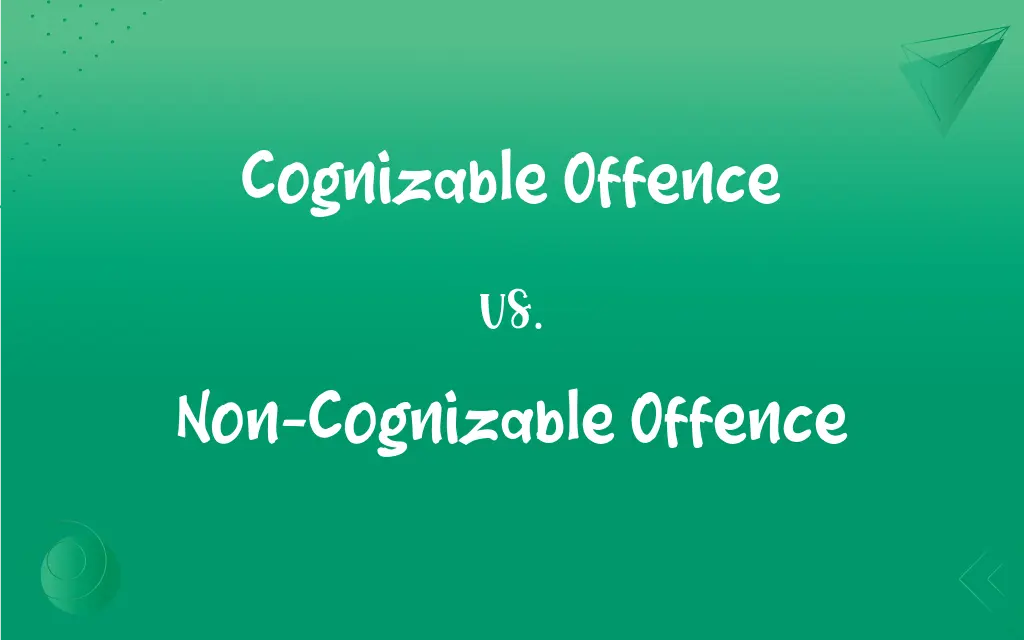Cognizable Offence vs. Non-Cognizable Offence: What's the Difference?
Edited by Aimie Carlson || By Janet White || Published on February 1, 2024
A cognizable offence allows police to arrest without a warrant and start an investigation; a non-cognizable offence requires a warrant for arrest and police cannot investigate without a court's permission.

Key Differences
A cognizable offence refers to serious crimes where the police have the authority to make an arrest without a warrant and initiate an investigation. In contrast, a non-cognizable offence involves less serious crimes where police require a warrant to arrest and cannot investigate without a court order.
In the case of a cognizable offence, the police have more autonomy; they can arrest suspects immediately and commence investigations without needing prior approval. On the other hand, for a non-cognizable offence, police intervention is limited; they must obtain a warrant for arrest and need judicial authorization to investigate.
Cognizable offences are typically more severe, encompassing serious criminal acts such as murder, rape, or theft. Non-cognizable offences are less severe and often include minor violations like petty theft or public nuisance.
When a cognizable offence is reported, the legal process begins immediately with police action. In contrast, non-cognizable offences require the complainant to approach a magistrate to file a complaint and seek permission for police to investigate.
Cognizable offences are thoroughly documented and require detailed police reports, as they involve more serious crimes. Non-cognizable offences, being less severe, have a simpler documentation process, often starting with a judicial complaint.
ADVERTISEMENT
Comparison Chart
Police Authority
Can arrest without warrant
Require warrant for arrest
Investigation Initiation
Can start investigation immediately
Need court's permission to investigate
Severity of Crime
Involves serious crimes (e.g., murder, rape)
Involves less serious crimes (e.g., nuisances)
Legal Process
Immediate police action possible
Requires filing a complaint with a magistrate
Documentation
Detailed police reports required
Simpler documentation process
ADVERTISEMENT
Cognizable Offence and Non-Cognizable Offence Definitions
Cognizable Offence
In cognizable offences, the law enforcement officers have the right to take suo motu action.
The large-scale drug trafficking was a cognizable offence, leading to a suo motu police raid.
Non-Cognizable Offence
In non-cognizable offences, police require judicial sanction to take any legal action.
The minor altercation at the restaurant was a non-cognizable offence, and police action was contingent on court approval.
Cognizable Offence
These offences involve crimes of a serious nature, prompting swift police intervention.
The homicide was a cognizable offence, necessitating urgent police investigation.
Non-Cognizable Offence
These offences involve less serious crimes and often need judicial permission for investigation.
The case of vandalism in the park was a non-cognizable offence, awaiting a magistrate's directive for investigation.
Cognizable Offence
A cognizable offence is a serious criminal act where immediate police action is permitted.
The robbery at the bank was a cognizable offence, leading to immediate arrest of the suspects.
Non-Cognizable Offence
Non-cognizable offences require the complainant to approach a magistrate to initiate legal action.
The dispute over property boundaries was a non-cognizable offence, leading the parties to file a complaint with a magistrate.
Cognizable Offence
Cognizable offences are those where police have the authority to arrest without a warrant.
In the case of the hit-and-run, it was a cognizable offence, allowing the police to apprehend the driver without delay.
Non-Cognizable Offence
Non-cognizable offences are those where police intervention is limited without court orders.
The neighbor's noise complaint was a non-cognizable offence, requiring court approval for police action.
Cognizable Offence
Cognizable offences include actions that warrant immediate legal attention and action.
The act of arson at the historical site was a cognizable offence, calling for immediate police response.
Non-Cognizable Offence
A non-cognizable offence is a minor crime requiring a warrant for police to arrest.
The petty shoplifting was a non-cognizable offence, necessitating a warrant for the suspect's arrest.
FAQs
What is a non-cognizable offence?
A non-cognizable offence is a less severe crime where police need a warrant for arrest and court permission to investigate.
Can police arrest someone without a warrant in a cognizable offence?
Yes, in a cognizable offence, police can arrest without a warrant.
What is a cognizable offence?
A cognizable offence is a serious crime where police can arrest without a warrant and start investigations immediately.
Is a murder a cognizable offence?
Yes, murder is a cognizable offence.
Can police immediately investigate a cognizable offence?
Yes, police can immediately investigate a cognizable offence without needing court permission.
Is a noise complaint a non-cognizable offence?
Yes, a noise complaint is usually a non-cognizable offence.
Do police need court permission to investigate a non-cognizable offence?
Yes, police need court permission to investigate a non-cognizable offence.
What kind of crimes are considered cognizable offences?
Serious crimes like murder, rape, and theft are considered cognizable offences.
Do police need a warrant to arrest in a non-cognizable offence?
Yes, in a non-cognizable offence, police require a warrant to arrest.
How is a non-cognizable offence processed legally?
A non-cognizable offence requires filing a complaint with a magistrate and seeking permission for police action.
Can a non-cognizable offence become a cognizable offence?
Yes, under certain circumstances, a non-cognizable offence can be reclassified as cognizable based on its severity or nature.
Are cognizable offences bailable?
It depends on the specific offence and legal provisions; some cognizable offences are bailable, while others are not.
How are cognizable offences recorded by the police?
Cognizable offences are recorded in detail with a First Information Report (FIR) and comprehensive investigation.
What is the role of a magistrate in a non-cognizable offence?
In a non-cognizable offence, a magistrate plays a crucial role in permitting police to investigate and take action.
What is the legal process for a cognizable offence?
The legal process for a cognizable offence involves immediate police action and investigation.
Who decides whether an offence is cognizable or non-cognizable?
The classification of an offence as cognizable or non-cognizable is defined by law, often in criminal statutes.
How are non-cognizable offences documented?
Non-cognizable offences are documented through a less formal process, often starting with a complaint to a magistrate.
Are non-cognizable offences less serious than cognizable offences?
Yes, non-cognizable offences are generally less serious than cognizable offences.
Are non-cognizable offences always bailable?
Most non-cognizable offences are bailable, but it depends on the legal provisions and the nature of the offence.
Can a private individual arrest someone for a cognizable offence?
In some jurisdictions, private individuals may have the right to arrest someone committing a cognizable offence.
About Author
Written by
Janet WhiteJanet White has been an esteemed writer and blogger for Difference Wiki. Holding a Master's degree in Science and Medical Journalism from the prestigious Boston University, she has consistently demonstrated her expertise and passion for her field. When she's not immersed in her work, Janet relishes her time exercising, delving into a good book, and cherishing moments with friends and family.
Edited by
Aimie CarlsonAimie Carlson, holding a master's degree in English literature, is a fervent English language enthusiast. She lends her writing talents to Difference Wiki, a prominent website that specializes in comparisons, offering readers insightful analyses that both captivate and inform.

































































